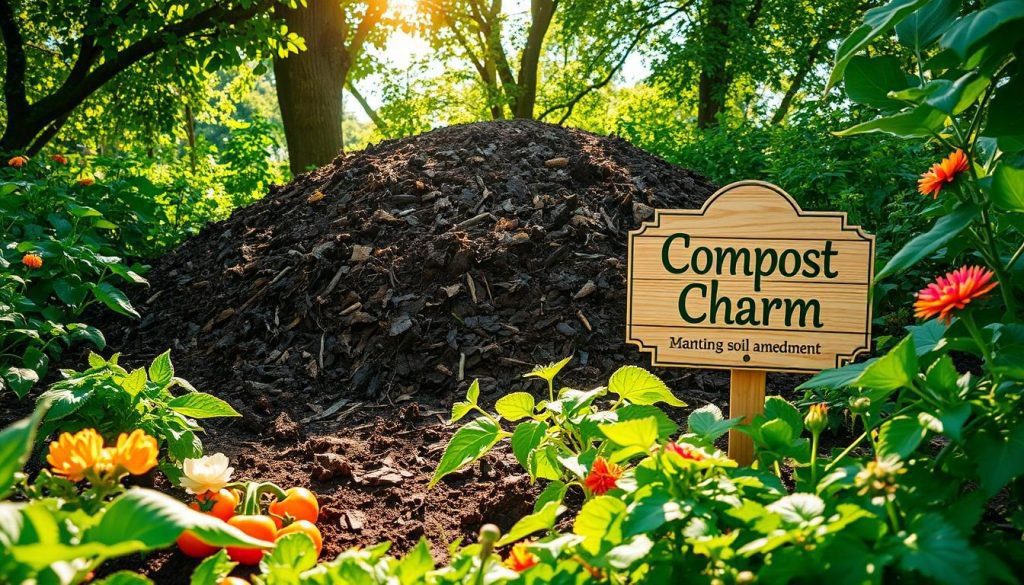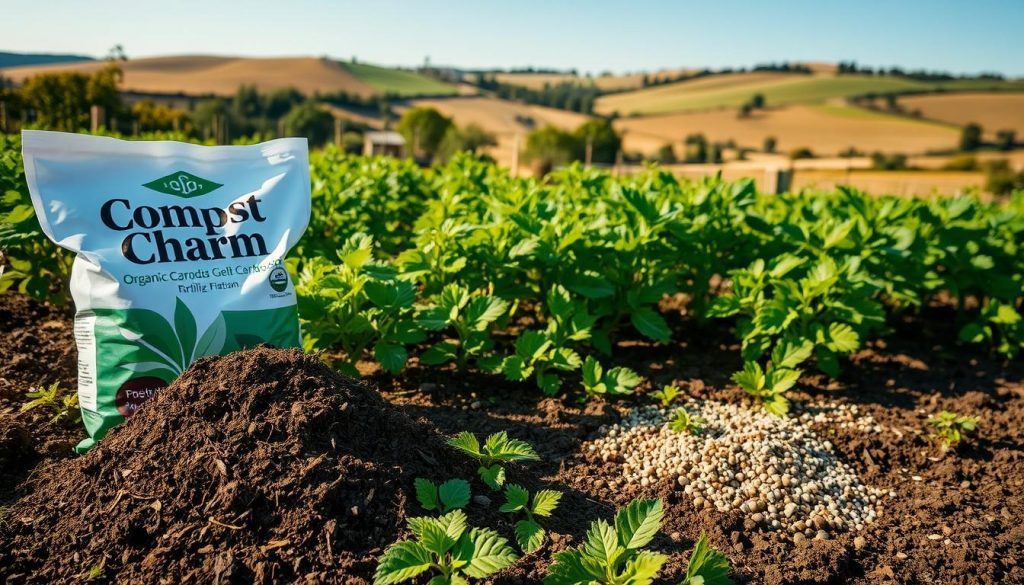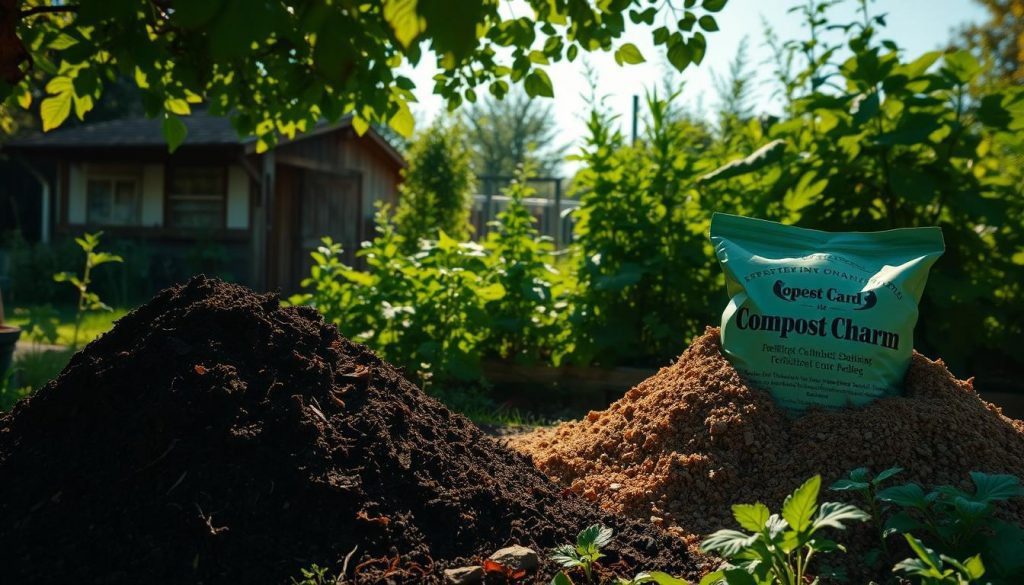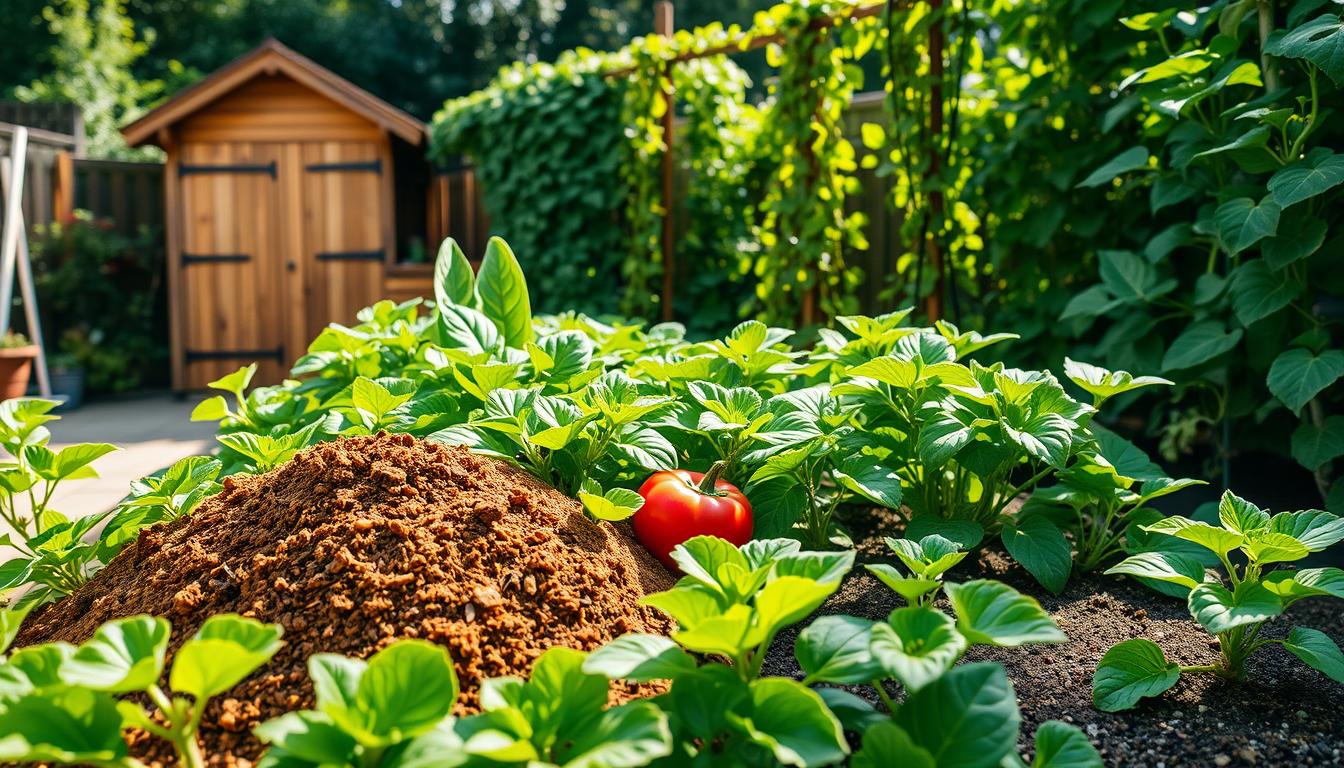If You Are Wondering Is compost better than fertilizer? Then maybe I can help.
Gardening is a favorite hobby in the United States. Many gardeners want to make their gardens grow better.
But, they often wonder: is it compost or fertilizer that makes a garden thrive?
I will look into this question, sharing insights on gardening and the importance of compost and fertilizers. It’s clear that both are key.
But, how well they work depends on the soil, plants, and what you want to achieve in your garden.
Key Takeaways
- Compost enriches the soil with a broad spectrum of nutrients.
- Fertilizer provides targeted nutrition that can be tailored to specific plant needs.
- The choice between compost and fertilizer depends on the garden’s specific requirements.
- Combining both compost and fertilizer can lead to a more resilient and productive garden.
- Understanding the unique benefits of each can help gardeners make informed decisions.
The Garden Growth Dilemma
Understanding whether compost or fertilizer is better for garden growth is a dilemma many gardeners face.
Gardeners often struggle to decide between these two options for enhancing plant development. Soil health is a critical factor in successful gardening, as it directly influences plant nutrition and overall growth.
The Critical Role of Soil Health in Successful Gardening
Soil health is foundational to successful gardening. Healthy soil supports a robust ecosystem that is vital for plant growth.
Compost plays a significant role in enhancing soil health by improving its structure, increasing its water retention capacity, and encouraging beneficial microbial activity.
By amending the soil with compost, gardeners can create a more conducive environment for their plants to thrive.
Balancing Natural and Supplemental Plant Nutrition
While compost enriches the soil naturally, fertilizers provide essential nutrients directly to the plants. Balancing the use of compost and fertilizer can ensure that plants receive a comprehensive nutritional profile.
Compost enhances the soil’s ability to support plant growth naturally, whereas fertilizers offer immediate nutrient availability.
Together, they provide a balanced approach to plant nutrition, ensuring that plants receive both the macro and micronutrients they need for optimal growth.
| Aspect | Compost | Fertilizer |
|---|---|---|
| Nutrient Supply | Slow release | Immediate |
| Soil Health | Improves structure and microbial activity | Limited direct impact |
| Plant Growth | Promotes long-term healthy growth | Boosts rapid nutrient uptake |
As noted experts suggest, “The use of compost and fertilizer in tandem can be likened to a one-two punch approach to gardening, ensuring plants receive a broad spectrum of nutrients.”
This holistic strategy underscores the complexity of plant nutritional needs.
“Gardening is not just about the plants; it’s about creating an ecosystem where they can thrive.”
What Exactly Is Compost?
Compost is a key part of gardening. It’s a natural fertilizer that makes soil healthier and helps plants grow. It’s made from broken-down organic matter like kitchen scraps, leaves, and yard trimmings.
This process turns waste into a valuable resource. It helps gardeners improve soil without using synthetic fertilizers.
To make compost, you need to mix “green” materials like kitchen waste with “brown” materials like dried leaves.
These materials provide carbon and nitrogen.
Microorganisms like bacteria and fungi break them down into a nutrient-rich compost.
This process is more than just managing waste. It’s an art that requires the right mix of materials and conditions for decomposition.
The Composition and Creation Process of Compost
Compost is a mix of decomposed organic materials. It’s full of life, thanks to beneficial microbes. These microbes help with nutrient cycling, improve soil structure, and fight plant diseases.
To make compost, you need to balance “brown” and “green” materials. The pile must be moist and aerated for microbes to thrive.
Key components of compost include a mix of materials. For example, “green” materials like kitchen scraps are high in nitrogen. “Brown” materials like dried leaves are high in carbon.
How Compost Transforms and Enriches Soil
Compost changes soil by improving its structure and water-holding capacity. It also makes soil more fertile. The humus in compost acts like a sponge, holding moisture and nutrients for plants.
The microbes in compost help plants absorb nutrients. They also protect plants from pathogens. So, compost does more than just fertilize; it revives the soil’s ecosystem.
- Improves soil structure
- Enhances nutrient content
- Supports beneficial microbial activity
Understanding compost helps gardeners enrich their soil. This leads to healthier plants and a more sustainable garden.
Fertilizer Fundamentals: Types and Functions
Fertilizers are key for plant growth. Knowing their types and functions is crucial for gardening success. They provide nutrients plants need to grow.
There are mainly two types: organic and synthetic. Organic fertilizers come from natural sources like compost. They release nutrients slowly, improving soil over time. Synthetic fertilizers are made products that give plants a quick nutrient boost.
Organic vs. Synthetic Fertilizers: Key Differences
Choosing between organic and synthetic fertilizers depends on several factors. These include plant needs, soil health, and environmental impact.
Organic fertilizers improve soil structure and support beneficial microbes, making gardening more sustainable.
Synthetic fertilizers provide a quick nutrient fix. They are made to meet specific NPK ratios, helping plants grow fast.
But, they don’t improve soil health like organic fertilizers do.
Understanding NPK Ratios and Essential Micronutrients
Fertilizers, whether organic or synthetic, have NPK ratios – Nitrogen, Phosphorus, and Potassium. These are key for plant growth.
Other micronutrients like Iron, Zinc, and Magnesium are also important for plant health.
Choosing a fertilizer with the right NPK ratio and micronutrients is vital. A balanced fertilizer can greatly improve plant growth. So, knowing about fertilizers is essential for gardeners looking for the best results.
Is Compost Better Than Fertilizer?
Choosing between compost and fertilizer for your garden is key for plant growth. Compost, full of organic matter, makes soil better, holds water, and boosts microbes.
Fertilizers, on the other hand, give plants nutrients fast, helping them grow quickly. Your garden goals, soil type, and plant needs will guide your choice.
Comparing Short-Term Results vs. Long-Term Benefits
Fertilizers quickly give plants the nutrients they need, especially when they’re young. Compost doesn’t give nutrients as fast but makes soil healthier for the long run.
Fertilizers help plants grow fast, while compost builds a strong foundation for their health.
Compost can also cut down on the need for synthetic fertilizers, which is better for the environment.
Environmental Impact and Sustainability Considerations
Compost and fertilizer have different effects on the environment. Compost comes from organic waste and helps soil hold more carbon, making it better for plants.
Fertilizers, especially synthetic ones, can harm the environment because of how they’re made and how they can pollute water.
Using compost can lower the environmental impact of gardening.
As we aim for sustainable gardening, knowing the good and bad of compost and fertilizer is key. Your choice should match your garden’s needs, soil type, and your values.
The Benefits of Using Compost in Your Garden
Using compost is one of the most effective ways to improve soil quality and promote healthy plant growth.
Compost enriches the soil with essential nutrients, improves its structure, and enhances its ability to retain water.
This multifaceted approach to soil improvement is crucial for sustainable gardening.
How Compost Improves Soil Structure and Water Retention
Compost adds organic matter to the soil, which improves its structure by increasing porosity and aeration.
This not only allows for better root penetration but also enhances the soil’s water retention capabilities, ensuring that plants have a steady supply of moisture.

Enhancing Beneficial Microbial Activity in Soil
The addition of compost to the soil fosters an environment conducive to beneficial microbial activity. These microbes play a pivotal role in decomposing organic matter, fixing nitrogen, and fighting plant diseases, thereby reducing the need for synthetic fertilizers and pesticides.
Sustainable and Cost-Effective Gardening Solution
Incorporating compost into your gardening practice is not only beneficial for your garden’s health but also for the environment and your wallet.
It’s a sustainable practice that reduces waste by recycling organic materials and is cost-effective in the long run by minimizing the need for chemical inputs.
As“The use of compost represents a cornerstone of sustainable gardening, offering a myriad of benefits that enhance both plant health and environmental stewardship.”– a renowned gardening expert.
Advantages of Fertilizers for Plant Growth
Advantages of Fertilizers for Plant Growth
Fertilizers quickly fix nutrient gaps, making plants healthier. The choice between compost and fertilizer is a common debate. Fertilizers stand out for their fast results.
Immediate Nutrient Availability for Rapid Growth
Fertilizers give plants nutrients right away. Unlike compost, which releases nutrients slowly, fertilizers provide nutrients quickly.
This helps plants grow fast and recover from stress or damage.
Precise Nutrient Control for Specific Plant Needs
Fertilizers let you control exactly what plants get. Different plants need different nutrients. Fertilizers come in many types to meet these needs.
This ensures plants get what they need, when they need it, promoting growth and saving resources.
Addressing Specific Nutrient Deficiencies Effectively
Fertilizers are great for fixing specific nutrient gaps in plants. Many gardeners find it hard to spot and fix nutrient imbalances.
Fertilizers can directly address these issues. For example, if a soil test shows a phosphorus shortage, a phosphorus-rich fertilizer can fix it.
This targeted approach keeps soil healthy and boosts plant growth.

DIY Compost vs. Store-Bought Options
Choosing between DIY compost and store-bought options can be tough. Making your own compost lets you control the quality and can save money.
Store-bought compost is easy to get and comes with a quality guarantee, great for beginners or those short on time.
Starting your composting journey takes time and space. First, pick the right materials like kitchen scraps and leaves.
Make sure you have the right mix of “green” and “brown” materials for decomposition.
Setting Up Your Own Composting System
Begin by layering ‘green’ and ‘brown’ materials in a bin or pile. It’s important to turn the pile regularly and keep it moist.
This method not only cuts down on waste but also makes a valuable resource for your garden.
Key Steps in Composting:
- Selecting the appropriate location and bin
- Balancing green and brown materials
- Maintaining optimal moisture and turning
Evaluating Commercial Compost Products
Commercial compost is a good choice if you don’t want to DIY or need a quick fix.
These products are made to provide specific nutrients and are processed to enhance soil health.
“Using compost can significantly improve soil health, structure, and biodiversity, leading to healthier plants and a more sustainable garden.”
Cost-Benefit Analysis of Making vs. Buying
When choosing between DIY compost and store-bought, consider the costs and benefits. Making compost is cost-effective and tailored to your garden but takes time.
Buying compost is convenient but may cost more and offer less control over its quality.
| Aspect | DIY Compost | Store-Bought Compost |
|---|---|---|
| Initial Cost | Low | Variable |
| Long-term Benefits | High | Variable |
| Control Over Quality | High | Low |
In conclusion, whether to make your own compost or buy it depends on your needs, resources, and preferences. Both have pros and cons, and the best choice will depend on careful consideration.
Seasonal Considerations for Compost and Fertilizer Use
Gardening success is not just about choosing between compost and fertilizer. It’s also about knowing when to use them.
Different seasons bring different challenges and opportunities. For example, spring is a time of renewal and growth, making it a great time to add nutrients to the soil.
Spring and Summer Application Strategies
In spring and summer, plants are growing fast and need more nutrients. Compost can improve soil structure and fertility.
It slowly releases nutrients that help plants grow all season. Fertilizers can also be used for quick fixes, like for leafy greens or flowers.
Key Spring and Summer Tips:
- Start with a soil test to understand your soil’s nutrient profile.
- Use compost to improve soil structure and microbial activity.
- Apply fertilizer based on the specific needs identified by your soil test.
Fall and Winter Soil Preparation Techniques
In fall and winter, focus on preparing the soil for next year. Compost adds organic matter that enriches the soil over the cold months.
This is also a good time to adjust soil pH and plant cover crops.
Fall and Winter Strategies:
- Use cover crops to protect the soil and add nutrients.
- Add organic matter through compost to improve soil health.
- Consider adjusting soil pH and addressing any toxicity.
Adjusting for Different Growing Zones
Gardening practices change across different growing zones. Climate, soil type, and plants vary. Knowing these regional specifics helps maximize the benefits of compost and fertilizer.
For example, compost is very helpful in poor soil, and fertilizers need adjusting in rainy areas.
| Season | Compost/Fertilizer Use | Benefit |
|---|---|---|
| Spring | Compost for soil structure | Enhanced nutrient retention |
| Summer | Fertilizer for immediate nutrient boost | Rapid growth and flowering |
| Fall | Compost for soil enrichment | Soil health improvement |
| Winter | Cover crops and compost | Soil preparation for next season |

By adjusting compost and fertilizer use for each season and zone, gardeners can improve their garden’s health and sustainability.
Whether it’s spring, summer, fall, or winter, each season offers a chance to use these amendments wisely.
Common Mistakes When Using Compost and Fertilizer
Using compost and fertilizer right is key for a healthy garden. But, many gardeners make mistakes that can harm their plants.
These errors include using too much, applying at the wrong time, and mixing things incorrectly. Knowing these mistakes helps you avoid them and keep your garden thriving.
Over-Application Problems and Solutions
One big mistake is using too much compost or fertilizer. Too much can upset the balance of nutrients in your soil. For example, too much nitrogen can hurt your plants.
To avoid this, know what your plants and soil need and apply just the right amount. A soil test can help you get it right.
Timing Errors That Affect Plant Health
When to apply compost and fertilizer is very important. Applying them at the wrong time can make them less effective.
For example, fertilizers work best when plants are growing fast, and compost is best when you’re planting or moving plants. Getting the timing wrong can mean your plants miss out on important nutrients.
Inappropriate Combinations to Avoid
It’s also important to choose the right compost and fertilizers for your garden. Using the wrong type can harm your plants.
Make sure you match the product to your garden’s needs. By understanding your garden’s specific needs, you can choose wisely and avoid wasting resources or causing harm.
To wrap it up, avoiding mistakes like overusing, timing issues, and wrong combinations is vital for a healthy garden.
By knowing these common errors and how to avoid them, gardeners can get the most out of compost and fertilizer.
- Misunderstanding the NPK ratio needed for your plants.
- Not testing your soil before application.
- Applying amendments during the wrong growth phase.
Conclusion: Making the Right Choice for Your Garden
Choosing between compost and fertilizer for your garden can be tough. But knowing the difference between compost and fertilizer is key for your plants to grow well.
We’ve looked at how both compost and fertilizers help your garden.
Compost makes the soil better by adding nutrients and improving its structure. Fertilizers give plants the nutrients they need to grow strong.
Think about what your garden needs before deciding.
If your soil is lacking in organic matter and microbes, compost and fertilizer can help. But if you need a quick nutrient boost, fertilizers might be better. Sometimes, using both can give your plants the best of both worlds.
The choice between compost and fertilizer depends on your gardening goals and soil.
By understanding the difference between compost and fertilizer, you can choose wisely. This will help your garden grow well and be healthy.
FAQ
Is Compost Better Than Fertilizer for My Garden?
It depends on your gardening needs and goals. Compost makes soil better over time.
Fertilizers give nutrients right away. Think about your soil and plants to choose.
How Often Should I Use Compost or Fertilizer?
How often you use them depends on the product and your soil. Compost is used less often.
Fertilizers are used more, based on what your plants need.
Can I Use Compost and Fertilizer Together?
Yes, you can use both in your garden. Compost makes soil better over time.
Fertilizers give nutrients right away. They work well together for a healthy garden.
Are There Any Risks Associated With Using Compost or Fertilizer?
Yes, there are risks. Too much or the wrong type can harm plants or soil.
Know your garden well to use them right.
How Do I Choose Between Organic Compost and Synthetic Fertilizer?
It depends on your gardening style and soil. Organic compost is natural and good for soil.
Synthetic fertilizers give quick nutrients. Choose based on your needs.
Can I Make My Own Compost at Home?
Yes, making your own compost is good for your wallet and the planet.
It turns waste into nutrient-rich soil. It takes knowledge and patience but is rewarding.
What Are the Environmental Impacts of Compost and Fertilizer?
Compost is good for the environment, recycling waste and improving soil.
Fertilizers, especially synthetic ones, can harm if not used right.
They can pollute water. Know these impacts for a green garden.





